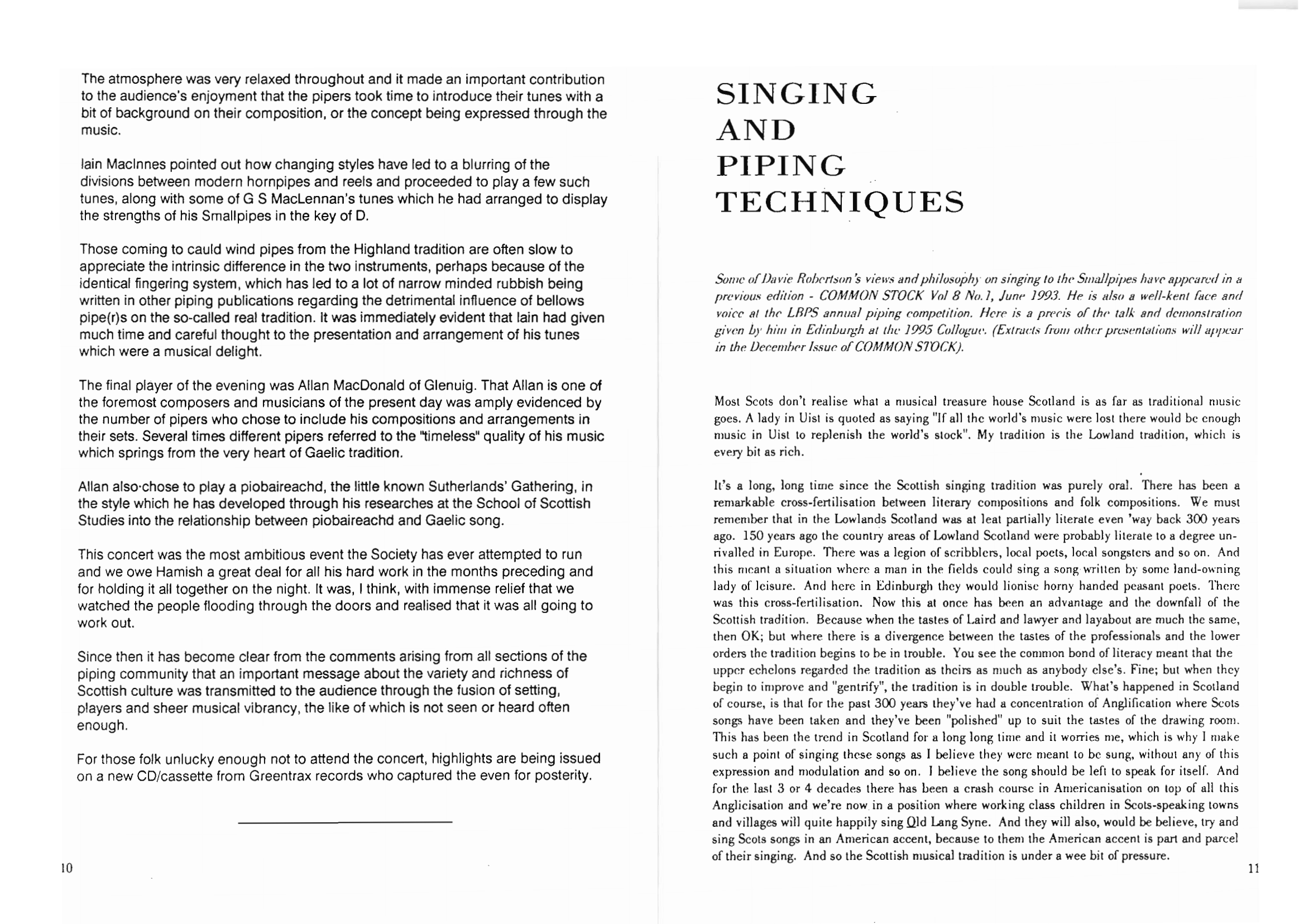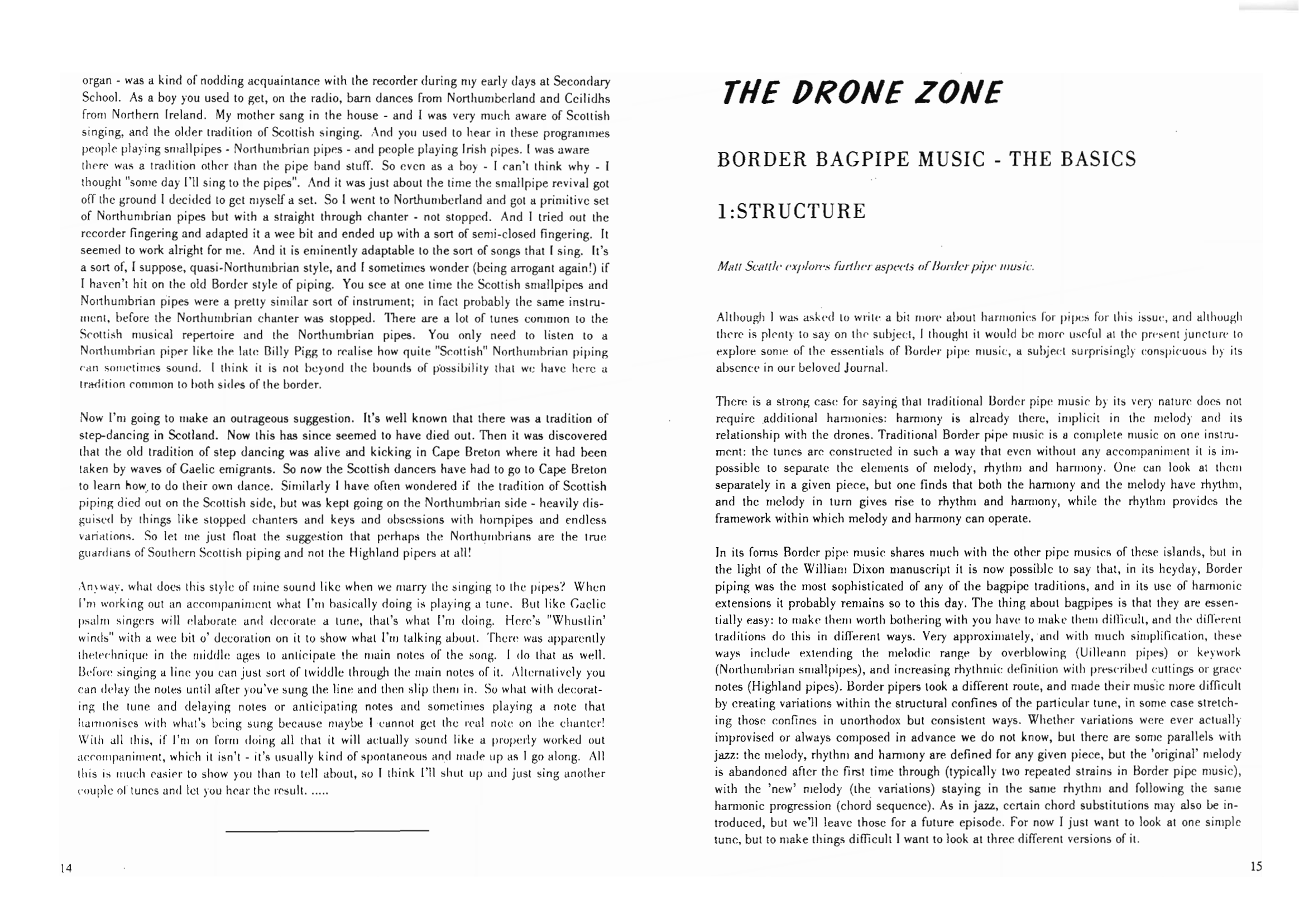Singing and Piping Techniques


Some of Davie Robertson’s views and philosophy on singing to the Smallpipes have appeared in a previous edition - COMMON STOCK Vol 8 No.1, June 1993. He is also a well-kent face and voice at the LBPS annual piping competition. Here is a précis of the talk and demonstration given by him in Edinburgh at the 1995 Collogue. (Extracts from other presentations will appear in the December Issue of COMMON STOCK).
Most Scots don’t realise what a musical treasure house Scotland is as far as traditional music goes. A lady in Uist is quoted as saying “If all the world’s music were lost there would be enough music in Uist to replenish the world’s stock”. My tradition is the Lowland tradition, which is every bit as rich.
It’s a long, long time since the Scottish singing tradition was purely oral. There has been a remarkable cross-fertilisation between literary compositions and folk compositions. We must remember that in the Lowlands Scotland was at least partially literate even ‘way back 300 years ago. 150 years ago the country areas of Lowland Scotland were probably literate to a degree unrivalled in Europe. There was a legion of scribblers, local poets, local songsters and so on. And this meant a situation where a man in the fields could sing a song written by some land-owning lady of leisure. And here in Edinburgh they would lionise horny handed peasant poets. There was this cross-fertilisation. Now this at once has been an advantage and the downfall of the Scottish tradition. Because when the tastes of Laird and lawyer and layabout are much the same, then OK; but where there is a divergence between the tastes of the professionals and the lower orders the tradition begins to be in trouble. You see the common bond of literacy meant that the upper echelons regarded the tradition as theirs as much as anybody else’s. Fine; but when they begin to improve and “gentrify”, the tradition is in double trouble. What’s happened in Scotland of course, is that for the past 300 years they’ve had a concentration of Anglification where Scots songs have been taken and they’ve been “polished” up to suit the tastes of the drawing room. This has been the trend in Scotland for a long long time and it worries me, which is why I make such a point of singing these songs as I believe they were meant to be sung, without any of this expression and modulation and so on. I believe the song should be left to speak for itself. And for the last 3 or 4 decades there has been a crash course in Americanisation on top of all this Anglicisation and we’re now in a position where working class children in Scots-speaking towns and villages will quite happily sing Old Lang Syne. And they will also, would you believe, try and sing Scots songs in an American accent, because to them the American accent is part and parcel of their singing. And so the Scottish musical tradition is under a wee bit of pressure.
Now I’m going to make an outrageous suggestion. It’s well known that there was a tradition of step-dancing in Scotland. Now this has since seemed to have died out. Then it was discovered that the old tradition of step dancing was alive and kicking in Cape Breton where it had been taken by waves of Gaelic emigrants. So now the Scottish dancers have had to go to Cape Breton to learn how, to do their own dance. Similarly I have often wondered if the tradition of Scottish piping died out on the Scottish side, but was kept going on the Northumbrian side - heavily disguised by things like stopped chanters and keys and obsessions with hornpipes and endless variations. So let me just float the suggestion that perhaps the Northumbrians are the true guardians of Southern Scottish piping and not the Highland pipers at all!
Anyway, what does this style of mine sound like when we marry the singing to the pipes? When I’m working out an accompaniment what I'm basically doing is playing a tune. But like Gaelic psalm singers will elaborate and decorate a tune, that’s what I’m doing. Here’s “Whustlin’ winds” with a wee bit o’ decoration on it to show what I’m talking about. There was apparently the technique in the middle ages to anticipate the main notes of the song. I do that as well.
Before singing a line you can just sort of twiddle through the main notes of it. Alternatively you can delay the notes until after you've sung the line and then slip then in. So what with decorating the tune and delaying notes or anticipating notes and sometimes playing a note that harmonises with what's being sung because, maybe I cannot get the real note on the chanter!
With all this, if I’m on form doing all that it will actually sound like a properly worked out accompaniment, which it isn’t - it’s usually kind of spontaneous and made up as I go along. All this is much easier to show you than to tell about, so I think I’ll shut up and just sing another couple of tunes and let you hear the result. .....
